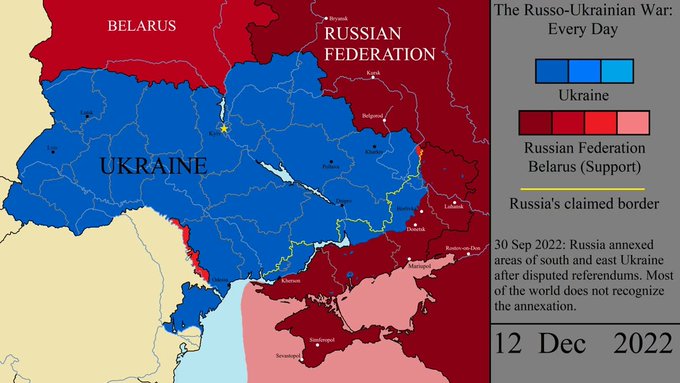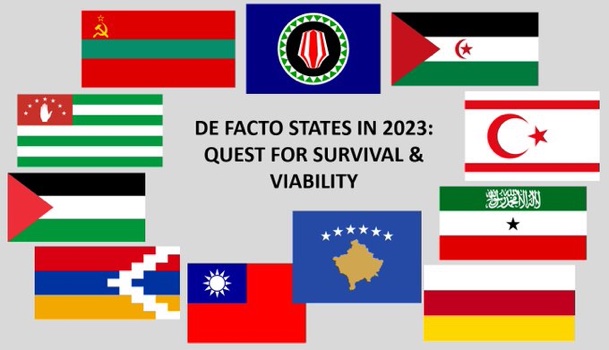Separatism and Unity in Bosnia and Herzegovina
On February 17th, Milorad Dodik—the Serb representative in Bosnia and Herzegovina’s (BiH) tripartite presidency—declared, in English notably, “Goodbye (BiH), welcome RS-exit.” RS, referring to Republika Srpska—BiH’s Serb entity. Evoking his own version of ‘brexit,’ Dodik led Serb representatives in a call for the nation to restructure its Constitutional Court after their, perceived unfair, verdict limiting Bosnian Serbs from claiming federal land (something some believed was an attempt to secure more territory for Republika Srpska). Dodik set an ultimatum—60 days—for the country to dismiss three foreign judges (as mandated by the Dayton agreement, more below)… if not met… Dodik threatened Republika Srpska’s secession.
Why was this ultimatum fashioned; why did it, eventually, not succeed; and why does present unity not mean, necessarily, stability for the future of BiH… complex questions with, nevertheless, a summative answer—Milorad Dodik.
Dodik: Disrupter, Dictator, Distractor
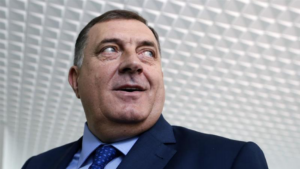
Darko Vojinovic/AP
Dodik, the president of Republika Srpska, is one of the three presidents of BiH. Sounds confusing, right? After the Bosnian War, the Dayton Peace Agreement, beyond ending armed conflict in the region, established one of the most complex governments in the world. For a brief overview of BiH’s government check out this video.
If that left you with more questions than answers, you’re not alone. BiH’s government is, fundamentally, divisive, byzantine, and fractured. It relies on cooperation and concurrently facilitates discord… discord that, recently, has been stoked by Dodik.
Once hailed as a “breath of fresh air in the Balkans,” by the former US Secretary of State Madeline Albright, Dodik has, progressively, become a proponent of self-determination, ethno-nationalism, and separatism. As Vukota Govedarica, a Serb political rival of Dodik, said: “he went from being an autocrat to a dictator.” Dictator or not, Dodik’s frequent calls for a referendum on Republika Srpska’s status have not gone unnoticed. Valentin Inzko, the high representative for the implementation of the Dayton Peace Agreement claimed: “We will insist that the Dayton Treaty is respected…Under the Dayton Agreement, entities have no right to secede.” Undeterred, Dodik’s attempts to fracture BiH have continued… the most recent of which was the February 17th ultimatum.
Dodik has, continually, claimed Republika Srpska’s secession is “inevitable.” In office, Dodik has repeatedly obstructed BiH’s parliament and Council of Ministers, each time seeking increased political power through ultimatums. In a series of blockades focused primarily on secession and political power, Dodik has, according to some analysts, drawn public attention away from “the essential problems of society in Bosnia and Herzegovina, such as low living standards in much of the country, poverty, social crisis, and air pollution.”
But now, as a pandemic harkens an unignorable crisis, Dodik has been unable to redirect attention to his own statehood goals.
A Bigger Issue
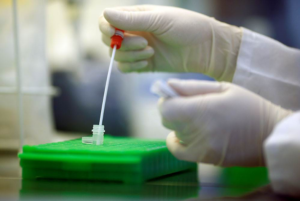
Reuters
April 18th, the 60-day deadline after Dodik’s most recent ultimatum, came and went. Under normal circumstances, April 18th probably would’ve marked a climax in divisiveness. However, since declaring a national emergency on March 16th, BiH has been united by a common enemy—COVID-19. Dodik, often a hawkish proponent of dissonance, even called upon “all citizens and all politicians to unite around the same goal – saving people’s lives”. He even lifted the blockade on BiH’s Council of Ministers in order to permit the government to effectively, and efficiently, handle the crisis.
It’s impossible not to see Dodik’s response as surprising… solidarity and cohesion don’t particularly fit with separatist ideology… especially when Dodik was threatening to fracture BiH a few weeks ago. But, as Slavko Kukic, a Bosnian analyst, explained: “for the first time after the [war] Bosnian nationalists have faced a true enemy that threatens the very biological existence, not just of one nation or one ethnic group, but everyone, including themselves and their families”. But, is this unity sustainable? After COVID-19 subsides will BiH remain (semi) united?
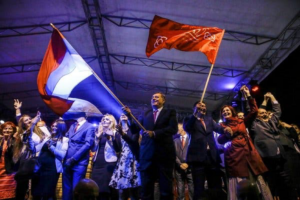
Milorad Dodik, center, president of the Serb autonomous region in Bosnia and Herzegovina, celebrating after a referendum on whether to honor the day Radovan Karadzic (a war criminal) declared a Serb-only state in Bosnia.
Sustainable Unity?
Crystal balls aside, it’s impossible to know what our world will look like after COVID-19. Nevertheless, in BiH, it is hard to imagine current unity will manifest into long term stability. In the words of Dodik, Republika Srpska “has embarked on the course of leaving Bosnia and Herzegovina and this course is irreversible.” While BiH’s focus is currently COVID-19, a panoply of issues lingers underneath the surface–the largest of which remains separatism.
Dodik’s secession campaign is not one easily undone by any crisis, let alone COVID-19. His sentiment remains: “Bosnia and Herzegovina is an arranged state, and we want out.” Despite the current focus on COVID-19, Dodik’s progression towards secession continues, and while he has sworn that he isn’t a “war leader,” COVID-19 may not be the greatest threat to BiH. In the week of the February 17th ultimatum, Dodik bought 2,500 rifles for his police force, stating he was rightfully supplying Republika Srpska’s police with protection… this may be true, but the timing is suspicious regardless. The post-COVID-19 world is, certainly, still a mystery; however, less mysterious will be BiH’s continued struggle to unite… especially with Milorad Dodik leading Republika Srpska.
Author: Annie Rose Healion



